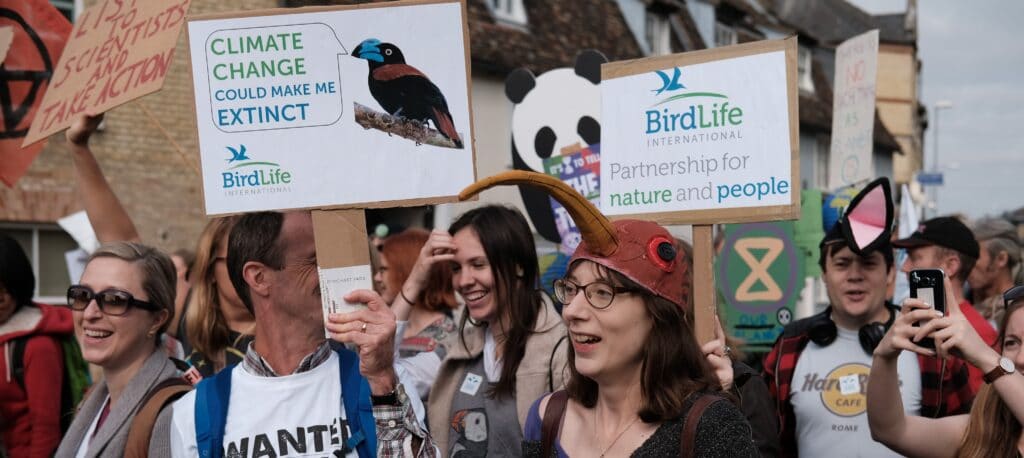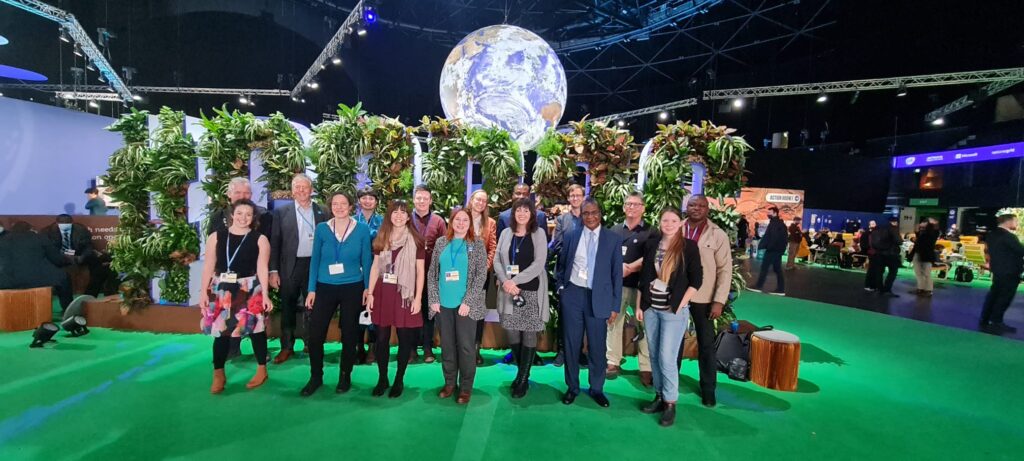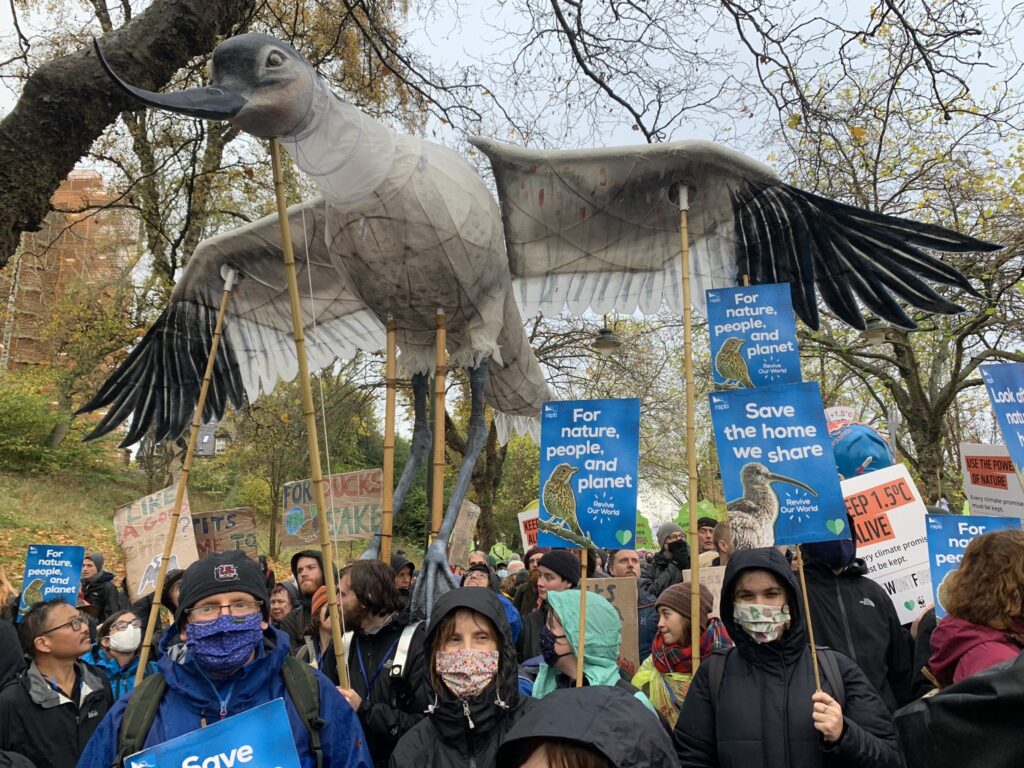BirdLife set to take the Power of Many to the UN climate summit

Yesterday, the UN climate summit (COP27) kicked off in Sharm El-Sheikh Egypt. Here, we dive into what it is, what to expect from it, and what results BirdLife are hoping to see.
By Rhiannon Niven, BirdLife’s Global Climate Change Policy Coordinator
This Autumn is a big one for global nature and climate action! Yesterday, the UN climate summit (COP27) kicked off in Sharm El-Sheikh Egypt, not long before the much-anticipated Convention on Biological Diversity (CBD) COP15 in December in Montreal, Canada. Not to mention the Ramsar COP14 and CITES COP19 meetings too! BirdLife will be present at all of these key meetings with our Partners, using our collective global voice to play instrumental advocacy and campaigning roles to ensure these summits bring us closer to achieving an equitable, carbon-neutral and nature-positive world.
Today we’re diving into the UN Climate COP27 – what it is, what to expect from it, and what we’re hoping to see as BirdLife.
What is COP27?
COP27 is the 27th meeting of the Conference of the Parties to the United Nations Framework Convention on Climate Change (UNFCCC) – that’s the UN Climate Convention. It’ll be taking place November 6th – 18th, in Sharm El-Sheikh, Egypt, a coastal city near to some of the world’s most renowned coral reefs, an ecosystem that across the world has already felt the devastating impacts of climate change.
These meetings happen annually, and last year’s – COP26 in Glasgow – made big headlines, with leaders coming together in an attempt to ‘keep 1.5 alive’. Despite falling short in many respects, particularly in terms of cutting fossil fuel emissions fast enough, COP26 did deliver a series of pledges and commitments for nature, at a larger scale than we’ve ever seen.

This year will mark 30 years since the UNFCCC was adopted and seven years since the Paris Agreement was agreed at COP21. With a focus on implementation, COP27 is billed as an ‘African COP’ both due to its location and the expectation that African countries’ exposure to some of the most severe impacts of climate change will be front and centre of the discussions.
The eyes of the world will soon be on Sharm El-Sheikh, looking for real commitment from international leaders to deliver on past promises (especially those made at COP26). The meeting comes at a crucial time – just last week the UN announced there is “no credible pathway to 1.5C in place”, so it is vital that COP27 serves as an opportunity for a new and enhanced commitment to dramatically scale up action to the level needed to deliver an equitable, nature-positive, net-zero emissions world.
What are BirdLife’s priorities?
BirdLife will be at COP27 ready to put our ‘Power of Many’ approach into action.
We will be there with our NGO Partners, beating the drum for nature to continue to be recognised and integrated into the climate conversation. The science is clear: if biodiversity loss continues and we continue to degrade and destroy our ecosystems, climate action will fail and vice versa. We will be pushing for the uptake of integrated approaches to tackle both the nature and climate crises through a rights-based approach, through negotiated COP decisions, meaningful policy action and long-term investment.

Below we set out our key priorities for COP27:
We want a strong political signal to be sent for ambitious outcomes in the Convention on Biological Diversity COP15
Just after COP27 concludes, the UNFCCC’s sister agreement – the Convention on Biological Diversity (CBD) – will start its COP15 summit. This summit comes at a crunch point for nature and has a big mandate on its shoulders – to bring countries across the world together to agree a global plan to halt and reverse nature loss this decade (termed the post-2020 Global Biodiversity Framework). As it stands, there is a huge amount left to do to make this framework ambitious, robust and in a state that is ready to be implemented across the globe. As the climate and nature summits are so close together, this is a unique and vital opportunity to build coordinated action, and raise much-needed momentum, urgency and unity for a transformational plan to ensure the world is nature-positive by 2030.
We want the delivery of climate and biodiversity integration at COP27
We know that the climate and nature crises must be tackled together; they are two sides of the same coin. There are a variety of opportunities for this integration to be more formally recognised and built into the UNFCCC process and implementation at COP27. One area is the ‘Global Stocktake’ which is the process used to monitor how the Paris Agreement is implemented and to evaluate our collective progress. Action on nature should be at the heart of this stocktaking process, given the role nature has in increasing resilience and reducing the impacts of climate change, as well as inspiring the world to take the actions we so critically need.
We want accountability and additional finance for nature in climate action
Real change relies on promises being turned into action. In a time of ever-increasing urgency, we can’t afford empty words to be offered without finance and a clear plan to underpin action, or accountability mechanisms to monitor progress.
Our local BirdLife Partner, Nature Conservation Egypt (NCE) has been working hard to influence the COP27 Presidency and see COP27 deliver a real step-change for the environment and climate in Egypt and across the region.
Khaled El Noby, NCE’s CEO says: “NCE organises and encourages civic participation from the scientific community and conservation practitioners and experts. We are keen to create an impact through national advocacy and international policy influence. We make a lot of effort to understand, digest and re-produce Western discourse of nature conservation to make them more suitable for Egyptian historical, cultural and natural contexts. For example, NCE is advocating for the recognition of local biodiversity data deficiency in developing countries. This acknowledgement is necessary to include local biodiversity conservation in various international conservation frameworks that mainly focuses on migratory forms of biodiversity due to their data availability status.
NCE plays also a significant role in connecting global leading conservation organisations such as BirdLife, with national conservation authorities such as the Ministry of Environment. We do this by being the manifestation of global initiatives and concepts locally on the ground.”
Stay tuned!
As we delve into a busy two weeks of COP27, we’ll be reporting progress on our priorities. Stay tuned to find out what happens and whether COP27 delivers the breakthroughs that are so desperately needed for a brighter future for nature, people and ultimately the entire planet.
Read here for more details on our key asks for the negotiations.
Stay up to date
Sign up to receive the latest bird conservation news. You’ll also receive updates about our projects, science and other ways to get involved including fundraising.
Thank you for your support, we are committed to protecting your personal information and privacy. For more information on how we use your data, please see our Privacy Policy. You can unsubscribe from emails at any time by using the link in the footer of any email from us.

